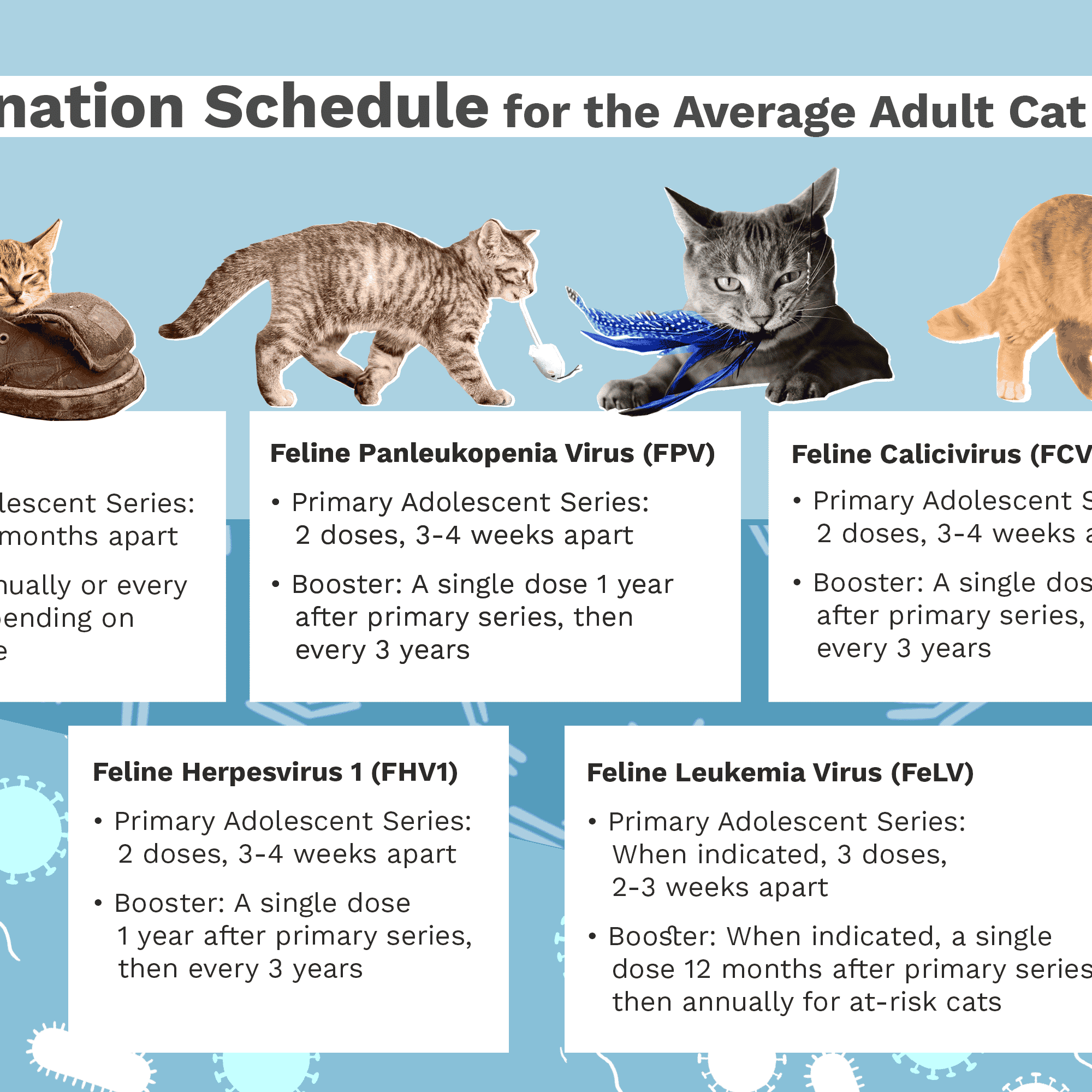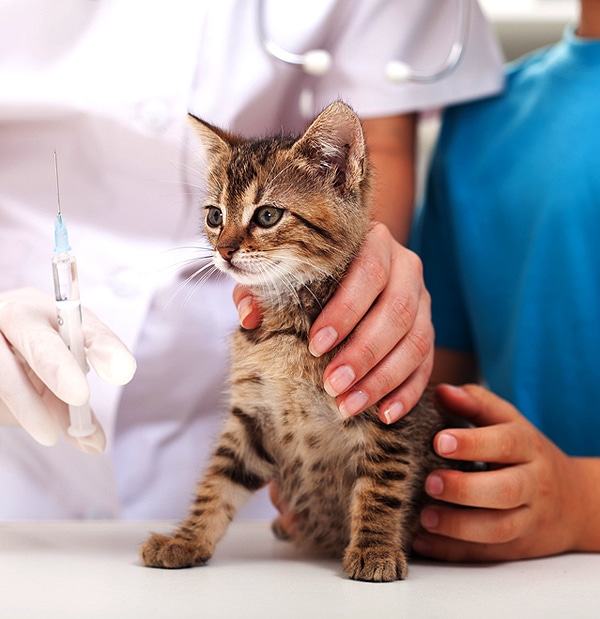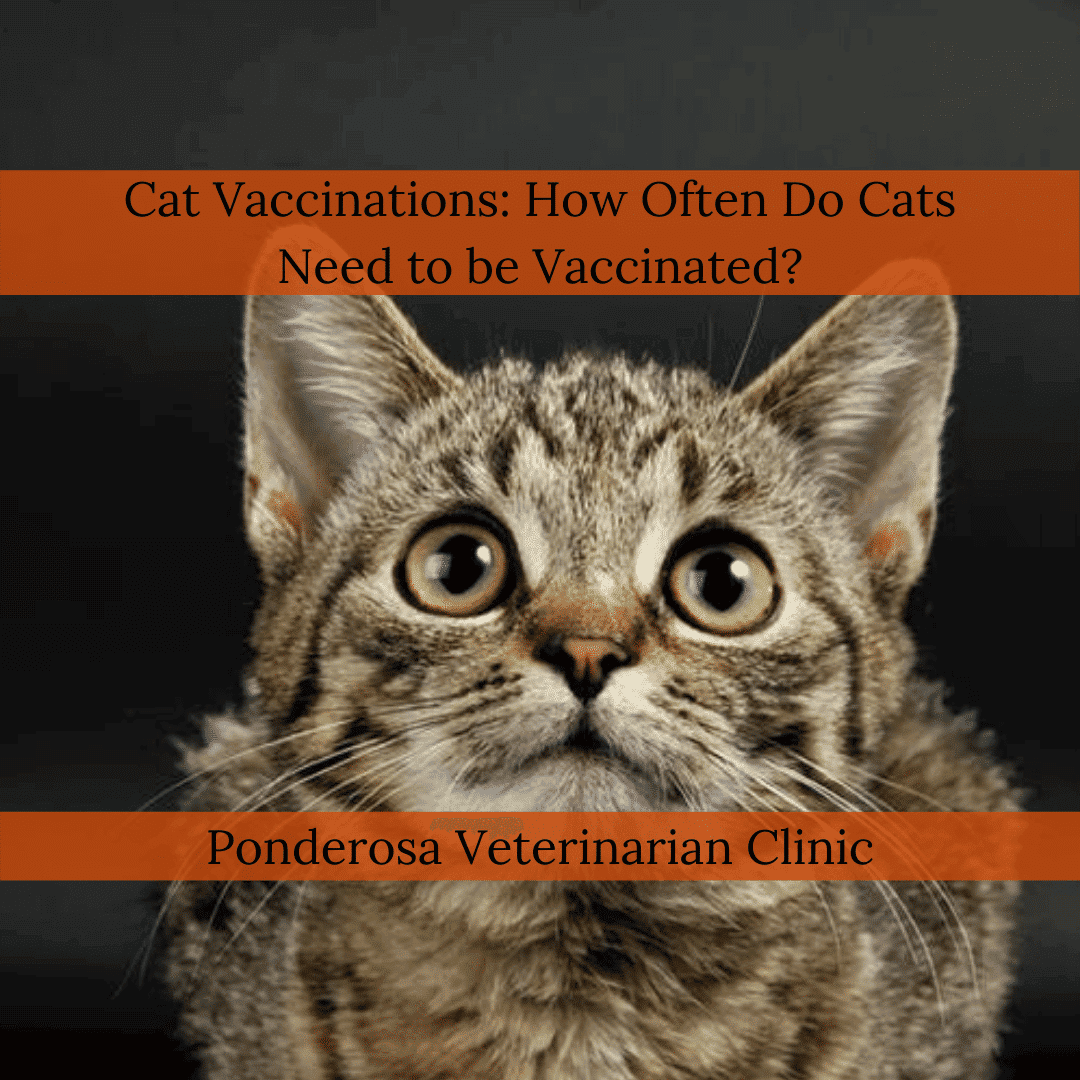What To Expect After Vaccination
Though it is uncommon, your kitten may experience slight side effects that appear very soon after the vaccination. These include lethargy and loss of appetite, or much less commonly, allergic reactions such as skin irritation, vomiting and diarrhoea. It is best to remain at the clinic for a short period after the vaccinations have been administered so your vet can monitor symptoms.
How Kitten Vaccinations Work
Kittens receive a series of vaccines over an 8- to 12-week period beginning at between 6 and 8 weeks of age. Some vaccines might be given together in one injection that is called a combination vaccine. At your kitten’s first veterinary exam, your vet will discuss a vaccination schedule as well as other treatments, such as deworming and beginning parasite prevention.
The vaccine injection itself is typically not very painful. Your kitten may feel a little pinch or sting, but many do not react at all.
At the first vaccine visit, your veterinarian will do an examination before vaccinating your kitten. Vaccines should never be given to a kitten with a fever or illness as the vaccine will not be effective. Giving a vaccine to a sick kitten can actually make her feel worse.
After a vaccine is administered, immunity is not immediate. It takes about seven to 10 days after the second vaccination to become effective. However, kittens with remaining maternal antibodies for that disease will not be affected by the vaccine. There is no way to be certain if a kitten still has maternal antibodies, so boosters are necessary. True immunity is uncertain until about 16 to 18 weeks of age, or until all kitten boosters are completed. Avoid exposing your kitten to unknown animals until all vaccinations have been given.
What Vaccines Do Kittens Need As Required By State Law Rabies
Rabies is the other core vaccine your state will require your kitten to receive. Rabies is a fatal disease that causes fever, headache, excess salivation, muscle spasms, paralysis, and mental confusion. It is spread from many types of wild animals to domestic pets and can be spread to humans. Depending on your state laws and the veterinarian, your kitten can receive this vaccination at about 12 weeks old.
Also Check: Good Cat Food Brands Wet
What Shots Do Kittens Need And When
Kittens need vaccination to stay healthy once they no longer have their mothers immunity to protect them against infectious diseases. Generally, there are two types of kitten shots:
- Core vaccines are essential shots required for all kittens and mature cats to defend against prevalent and/or harmful diseases.
- Non-core vaccines aren’t always necessary for all pet cats. Vets recommend these specific immunizations for cats at greater risk of illness. Non-core vaccines require an assessment of your cat’s lifestyle and location to determine the present level of risk for infection.
How Do Vaccines Work

To understand how vaccine schedules in cats are timed, you first need to understand how vaccines work, and what are core vaccines versus non-core vaccines.
Some vaccines contain inactive DNA or RNA from a pathogen, such as a virus or bacteria these are called killed vaccines. Some vaccines contain less pathogenic forms of the normal virus or bacteria these are called modified live vaccines. Some vaccines contain only a small part of a virus or bacteria inserted into an organism called a plasmid, that acts to amplify this portion of the virus or bacteria once an animal is vaccinated, these are called vectored or recombinant vaccines.
Modified live and killed vaccines are some of the original and more traditional vaccines, whereas vectored vaccines are a more recent scientific development. Each has possible pros and cons.
After receiving a vaccine, the body recognizes the foreign material contained in the vaccine and produces an immune response. This response takes about 714 days to reach a peak response. In part, this is why vaccines are timed 34 weeks apartto allow for this response, and then a settling of the immune system, before challenging it again with another vaccine.
You May Like: My Cat Is Spraying But He Is Fixed
Cost Of Kitten Vaccines
Each vaccine costs roughly $25 to $50 depending on the manufacturer and where you live. Your kitten will also usually need a physical examination to make sure that they are healthy enough to get vaccines.
The initial examination is usually with the veterinarian, and follow-up exams are either with the vet or a certified technician. The cost for the initial exam can range from $40-$60 on average. The follow-up visit cost might be lower with a technician.
How Much Are Kitten Vaccinations
The cost of kitten vaccinations will depend on several factors, including where you live, which veterinary clinic you go to, which vaccine you get, etc. Individual vaccinations for kittens can cost anywhere from $20 to $45. Most vets will want to complete a physical exam before vaccinating your pet, adding another $50 to $100 to the total cost. During the vet visit, your pet might require more than one vaccination which also increases cost.
Purchasing a wellness plan through a pet insurance company is one method to save money on kitten vaccinations. Wellness plans cover things like microchipping, annual wellness checks, routine dental treatment, spaying/neutering, and other preventive pet care services plus vaccines.
Pawlicy Advisor can assist you in comparing pet health insurance policies and wellness plans from leading pet insurance companies to discover the best coverage for your kitten’s specific requirements.
Read Also: How Much Wet Kitten Food Per Day
Are There Any Side Effects I Should Watch For After Cat Vaccination
Most cats show no ill side effect from receiving a cat vaccine. If your cat does have a reaction, they are usually minor and short-lived. However, you should still be on the lookout for the following symptoms that might indicate negative side effects from a cat vaccine:
- Swelling and redness around the injection site
If you suspect your cat is experiencing any ill side effects from his or her cat vaccine, call us immediately so we can help you to determine whether any special care is needed.
Why Should I Have My Female Cat Spayed
Spaying young cats offers several advantages:
- Your cat will avoid heat periods, which usually begin at six to seven months of age and occur every two to three weeks in an unbred cat. During the heat period, female cats encourage the attention of male cats. The female cat will posture and vocalize, which can be annoying to owners so too can the presence of neighborhood male cats that mark the territory outside your house and fight off other suitors. Sometimes the natural urge to mate is so strong that your indoor cat will attempt to escape outdoors to breed.
- Spaying prevents unplanned litters of kittens that often never find suitable homes.
- Spaying prior to the first heat cycle greatly reduces the risk of breast cancer.
- Spaying prevents cancers or infections of the reproductive organs.
Spaying a cat may be a common procedure, but all surgery must be taken seriously. The correct term for spaying is ovariohysterectomy, and refers to the complete removal of the uterus and ovaries under general anesthesia. An overnight stay in the hospital may be advised to allow close monitoring during recovery and provide adequate pain control .
You May Like: Royal Canin Cat Food Shortage
Core Vaccines For Cats Include:
Your veterinarian can tell you which non-core vaccines are recommended for your cat or kitten based on your cats lifestyle, age, exposure risk, and health status. Your veterinarian may not recommend continued FeLV vaccination after a year of age for an indoor-only cat that lives alone or has no FeLV-infected housemates.
It is important to note that, although a vaccine for feline immunodeficiency virus was once available, its effectiveness was questionable and the vaccine is no longer produced or distributed in North America. Vaccination against FIV is no longer recommended by the AAFP.
Additionally, although a vaccine for feline infectious peritonitis exists, the AAFP does not recommend vaccination for FIP. Vaccination against Bordetella bronchiseptica and Chlamydia felis is uncommon in cats. These vaccines are generally reserved for cats living in high-risk environments like shelters with a history of outbreaks of upper respiratory infections due to these bacteria.
What About Adverse Events
No injection or medication is without some degree of risk, but we continue to vaccinate because, in most cases, it is much smaller than the risk of the disease itself.
The overall incidence of adverse reactions in cats is reported to be about half of 1 percent and usually mild and self-limiting. Common side effects include lethargy, transient fever and local inflammation.
Anaphylaxis and death are, fortunately, extremely rare: about one in every 10,000 vaccines.
A vaccine-associated sarcoma is a slow-growing but locally aggressive cancerous mass that develops at vaccine injection sites. Sarcomas occur with about the same rare frequency as anaphylactic reactions.
For cats without a history of vaccine reactions, the risk of sarcomas is usually outweighed by the benefit of the core vaccines.
Pet owners can minimize the impact of sarcomas by monitoring injection sites for swelling after vaccinations. Swellings should be biopsied if they are larger than 2 centimeters, persist longer than three months, or grow one month past the date of vaccination. When sarcomas are addressed early, surgery is often curative.
You May Like: Russian Blue Kittens For Sale Seattle
Core Vaccines For Cats
Core vaccines are those recommended for all cats, no matter where they live or under what conditions.
The four core vaccines for cats are:
-
Feline Rhinotracheitis Virus/Herpesvirus 1
-
Feline Calicivirus
-
Feline Panleukopenia
These diseases are highly infectious and found worldwide. They are highly dangerous to young cats, and the vaccines are considered highly protective with minimal risk. This is why all cats should receive these core vaccines.
Vaccination Schedule For Kittens

The Spruce / Ellen Lindner
Your new kitten deserves the best start in life. This means providing everything she needs to grow and stay healthy. Vaccines are an important part of your kitten’s health care plan. Basic immunizations are essential to prevent your kitten from getting sick and avoid the spread of disease.
You May Like: Do Mother Cats Miss Their Kittens
How Often Do Kittens Need Vaccines
Once theyve had their primary vaccination course, your cat will need booster vaccinations every year. Not all diseases need vaccinating that often, but some do.
If theres been an outbreak of a particular disease in your area, your cat may need an extra booster.
Dont worry too much about which exact vaccine your kitten needs and when, your vet will keep you updated and make sure your feline friend stays in good health. All you need to do is turn up to their appointments!
Should Rabies Be A Core Cat Vaccine
However, not everyone agrees. Dr. Donna Alexander, administrator of Cook County Animal and Rabies Control says that rabies vaccines for cats should be considered core just as they are for dogs. Rabies has got to be core for cats, says Dr. Richard Ford, emeritus professor of medicine, North Carolina State University. And, in fact, over half the states require rabies vaccines for cats by law.
Most people think their cats are strictly indoors and never can be exposed, Dr. Alexander adds. Thats a fallacy. We have bats found in homes. And many of those people have cats, and those cats dont go out. They find the bat and even deliver the dead or nearly dead bat to family members as they would a mouse.
Also, so many mostly or exclusively outdoor cats may not be vaccinated at all, and they have a potentially high exposure to skunks, raccoons and other wildlife, which may carry rabies.
Based on the CDC recommendation, if an unvaccinated cat comes into contact with any animal thought to be rabid, that unvaccinated cat will be quarantined or euthanized.
Vaccine-related reactions due to the rabies vaccine are about one in a million and are likely not life threatening, Dr. Alexander says. Rabies kills 100 percent of the time, not to mention that anyone exposed to a cat thought to have rabies requires painful and expensive rabies desensitization themselves.
Read Also: Kittens For Sale Lexington Ky
Vaccines Truths And Myths
As with many medical interventions, there is often a misunderstanding of the benefits and risks of vaccination. This misunderstanding can sometimes lead well intentioned cat owners to make misinformed decisions about this vital aspect of feline health maintenance. Here are some examples of truths and myths regarding feline vaccination.
Truths:
- Vaccination protects all cats by making disease transmission less likely
- No vaccine is 100 percent effective, and the effectiveness of different vaccines varies
- Although uncommon, all feline vaccines carry the risk of feline injection site sarcoma
Myths:
- Vaccinating a cat against a disease can treat that disease
- Vaccinating a cat against a disease causes that disease
- All cats should receive every vaccine available for cats
Are There Any Risks With Vaccinating My Kitten
Vaccines are very safe for your kitten and they shouldnt suffer any long-term ill effects. Its quite common for them to be a bit lethargic or out of sorts after the jab but they usually recover quickly. Very rarely a kitten may suffer breathing difficulties or seizures. If youre at all worried its best to contact your vet straight away.
Read Also: Will Fixing My Cat Stop Spraying
When Should I Schedule Kitten Vaccinations And Cat Vaccinations
You should schedule your kitten vaccinations as soon as you get your new kitten. Regardless of the age, your new kitten should be seen by a veterinarian as soon as possible. It is important to get a preventive health care plan in place including vaccinations, deworming and flea control. In addition, we will spend time discussing behavioral training to make sure your kitten develops good behaviors and becomes a great pet.
Plan on spending at least thirty minutes at your first visit. This is a great time to get all your questions answered on kitten care and discuss the recommended preventive program with our veterinary team.
An adult cat vaccination schedule, which includes periodic booster immunizations, will be scheduled one year after the kitten vaccination schedule has been completed.
As with any other immunization protocol, a cat vaccination schedule should be adhered to without deviation, in order to ensure your cat remains healthy and well for the duration of his or her life. We cannot control all health issues but we can prevent the majority of infectious disease with the proper vaccine schedule.
What To Expect After Cat Vaccinations
After your cat receives vaccines, she might be a little sore at the injection site for a few days. The feeling is likely similar to what people feel after getting a flu vaccine.Its best to avoid touching your cat in the area where she was injected with the vaccine. Some cats are a little sleepy or lazy after getting shots, but this generally goes away on its own by the next day.
You May Like: Is Wet Or Dry Food Better For Cats
Recommended Cat Vaccination Schedule
You should always consult with your veterinarian about a vaccine schedule that works best for your cat. That being said, here are the recommended ages you should get your cat vaccinated, according to the American Animal Hospital Association :
- 6 weeks old: FVRCP vaccine
- 8 weeks old: FeLV vaccine
For rabies, the timing depends on your local laws and the vaccine label instructions. And for bordetella and chlamydia, thatll also depend on your vaccines specific instructions .
Now that you know which vaccines your cat definitely needs and which ones he might be able to skip, you can make sure hes up to date on all the shots that will keep him safe and healthy.
We independently pick all the products we recommend because we love them and think you will too. If you buy a product from a link on our site, we may earn a commission.
Risks Of Vaccines For Kittens

Although there are some risks when vaccinating your kitten, theyre very minor. Similar to humans, kittens who receive vaccines may experience some initial side effects, such as a low fever, decreased appetite, localized swelling, or tiredness.
These symptoms, however, usually start shortly after the vaccine and last only a few days. If your kitten continues to experience side effects, contact your veterinarian.
Some kittens may experience an allergic reaction to a vaccine. An allergic reaction can cause itchiness, hives, and swelling of the face, so if you see any of these symptoms, youll want to take your cat to the vet immediately, and reconsider vaccinating your kitty in the future.
Finally, in other rare situations, cats can develop feline injection-site sarcomas, or FISS. This type of malignant cancer is thought to be caused by persistent swelling from the spot where a cat was vaccinated, and has been associated with the FeLV vaccine and rarely, the rabies vaccine FISS tumors are aggressive and invade surrounding tissues, and can require surgery and radiation for treatment.
Overall, veterinarians and feline medical organizations like the AAHA and AAFP agree that the incidence of negative side effects as a whole is low, and the benefits of core kitten vaccines outweigh the risks.
Recommended Reading: Authority Cat Food Weight Management
What You Need To Know About Core And Non
Vaccines can be super important for your cat, but it feels like there are so many of them. So how are you supposed to know which ones he really needs?
The key is knowing which vaccines are considered core and which ones are considered non-core.
The Dodo spoke with Dr. Cristina Bustamante, an associate veterinarian with Caring Hands Animal Hospital in Florida and founder of Dr. B. Vet, to find out which vaccines all cats need.